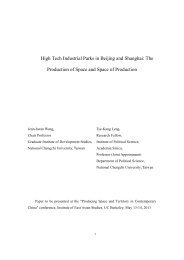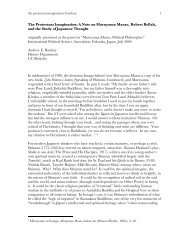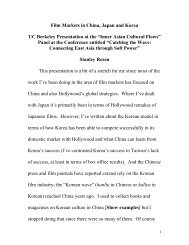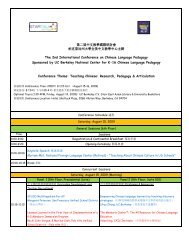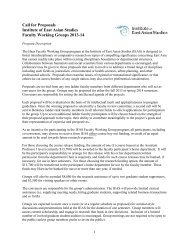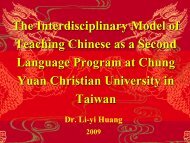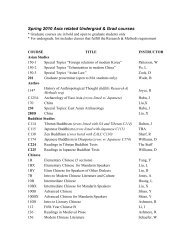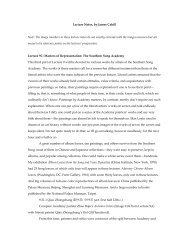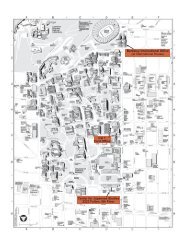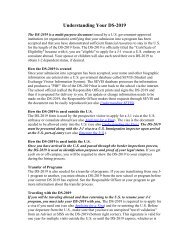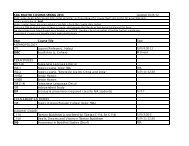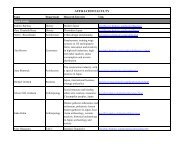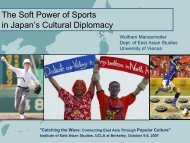Third Edition Spring 2013 - Institute of East Asian Studies, UC ...
Third Edition Spring 2013 - Institute of East Asian Studies, UC ...
Third Edition Spring 2013 - Institute of East Asian Studies, UC ...
You also want an ePaper? Increase the reach of your titles
YUMPU automatically turns print PDFs into web optimized ePapers that Google loves.
tension between Malaysia and China has rarely escalated. Armedconflict between the two countries has never occurred since theestablishment <strong>of</strong> diplomatic relations. 19 In dealing with territorialdisputes, both sides have agreed to follow the United NationsConvention on the Law <strong>of</strong> the Sea (UNCLOS), the Declaration onthe Conduct <strong>of</strong> Parties in the South China Sea, and the principle<strong>of</strong> “shelving disputes and seeking joint development.” 20 The ethnicChinese in Malaysia usually do not play any substantial role in suchinter-governmental interactions.How Chinese Language Education MattersOther than the general improvement in terms <strong>of</strong> politicalengagement and economic cooperation, the close China-Malaysiarelationship has boosted a high volume <strong>of</strong> cultural exchange betweenthe two countries. Due to the sharp imbalance <strong>of</strong> powerbetween the two countries, China’s cultural influence on Malaysiais far stronger than vice versa, is similar to the situation faced byother Southeast <strong>Asian</strong> countries. In addition, because <strong>of</strong> the largepercentage <strong>of</strong> ethnic Chinese, Malaysian society is not only moreaccommodating <strong>of</strong> Chinese culture, but there is also high demandto develop it locally.In societies where the Chinese presence is not significant,“Chinese culture” usually functions as a medium to showcase China’simage. In Malaysia, however, vaguely defined “Chinese culture”has multiple layers <strong>of</strong> meaning. First, it is an integral part <strong>of</strong> Malaysianculture itself, on which the identity <strong>of</strong> the Malaysian nationhas been politically constructed. Therefore, being recognized as an19 “Review: Disputes in the region”, Global Times, http://www.globaltimes.cn/SPECIALCOVERAGE/SouthChinaSeaConflict.aspx (accessed 2/17/<strong>2013</strong>)Also see “TIMELINE: The roots and present status <strong>of</strong> the WPS disputes”, The ManilaTimes, 02 September 2012, http://www.manilatimes.net/index.php/special-report/30222-timeline-the-roots-and-present-status-<strong>of</strong>-the-wps-disputes(accessed2/17/<strong>2013</strong>), “Timeline: Disputes in the South China Sea,” The Washington Post, 8 June2012, http://www.washingtonpost.com/wp-srv/world/special/south-china-sea-timeline/index.html(accessed 2/18/<strong>2013</strong>)20 Deng Xiaoping, Speech at the Joint Press Conference <strong>of</strong> the State Visit to Japan,“Ge Zhi Zheng Yi, Gong Tong Kai Fa”, http://www.mfa.gov.cn/chn/gxh/xsb/wjzs/t8958.htm (accessed 12/05/2012)indispensable pillar in Malaysia’s plural society, Chinese cultureplays an important role in maintaining racial harmony and mutualrespect amongst different ethnic groups. Secondly, Chinese cultureis extremely important for the Chinese community in Malaysia.More specifically, it is both a powerful weapon that ethnic Chinesewield in domestic political struggles against the non-Chinese dominantpowers, as well as representing an ultimate goal that they intendto achieve, namely preserving their cultural identity. Althoughless explicit than these first two layers, a third layer is equally important:Chinese culture (Indian culture is similar in this case) isconstantly manipulated as a label that reflects the “foreignness” <strong>of</strong>the ethnic Chinese in Malaysia, which distinguishes them from thepolitically more privileged “local” and “indigenous” bumiputera.Consequently, while preserving their cultural identity by keepingthis “foreignness” and “otherness,”ethnic Chinese have preventedthemselves from accessing political resources that exclusively belongto the bumiputera.Therefore, the term “Chinese culture” is very ambiguous inMalaysia, conveying the meaning <strong>of</strong> both Chinese culture from Chinaand the culture <strong>of</strong> Malaysian Chinese themselves. Despite thefact that there are many differences between the two, they are alsoclosely connected to one another. Under the banner <strong>of</strong> preservingcultural identity, ethnic Chinese in Malaysia engage themselvesactively in cultural exchanges with China, including activities suchas ancestor worship, education cooperation, and joint festival celebrations.In respect to culture, the Chinese community benefitsmore from the close China-Malaysia bilateral relationship thanother ethnic groups.As the guardian <strong>of</strong> both the interests <strong>of</strong> the state and moreimportantly, the bumiputera community, the UMNO-controlledgovernment <strong>of</strong>ten plays seemingly contradictory roles in promoting—andsimultaneously curbing—the development <strong>of</strong> Chineseculture. As previously mentioned, the Malaysian government hasimplemented a series <strong>of</strong> economic policies that favor the bumiputerain terms <strong>of</strong> subsidies for real estate purchases, quotas for publicequity shares, and land ownership, etc. In fact, the government’sfavorable treatment <strong>of</strong> the bumiputera has gone far beyond therealm <strong>of</strong> purely economic interests. In the field <strong>of</strong> education, for in-15 Kankan Xie Ethnicity And China-Malaysia Relations 16



